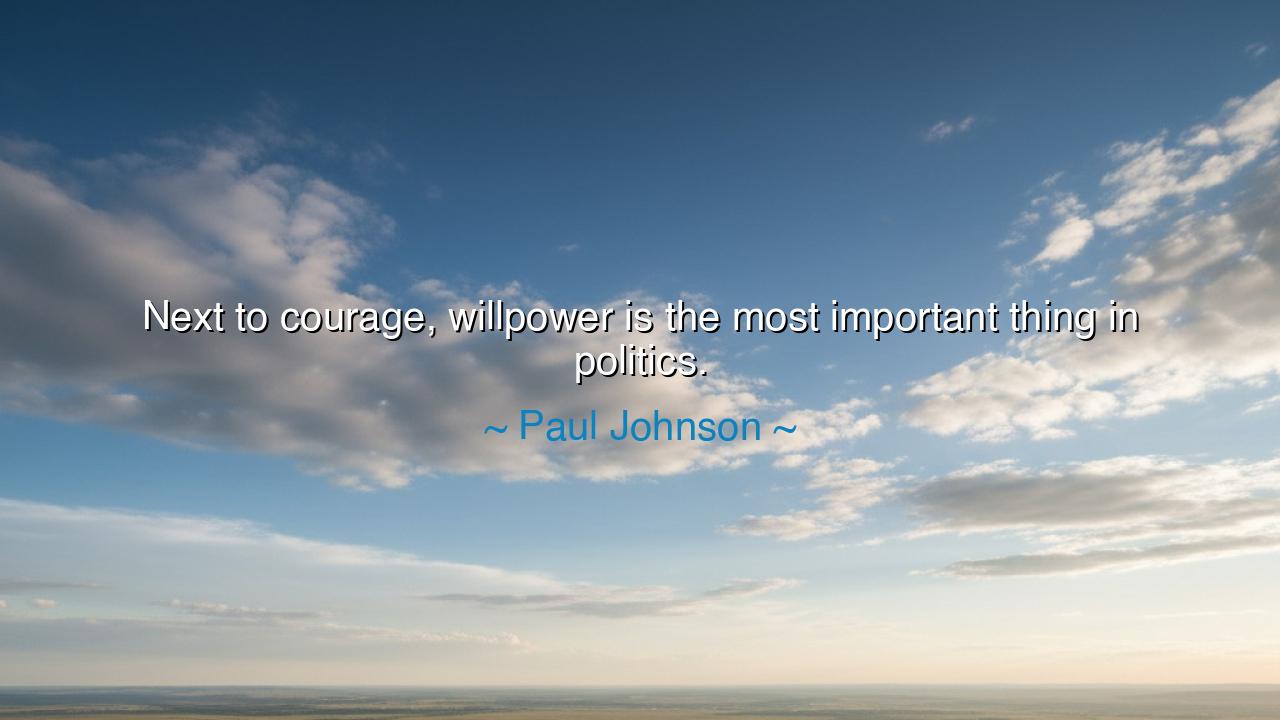
Next to courage, willpower is the most important thing in






“Next to courage, willpower is the most important thing in politics.” — Thus declared Paul Johnson, the English historian and chronicler of power, whose sharp eye saw through the illusions of public life and into the hearts of those who wield it. His words speak of a truth as old as civilization itself: that leadership, whether of nations or of souls, depends not merely on vision or eloquence, but on the union of courage and willpower. For courage gives birth to action, but willpower sustains it; courage charges into the storm, but willpower endures the long night that follows. Without both, the fires of greatness flicker and die.
In the world of politics — and in the governance of any human community — there are many who begin with boldness but few who persist with strength. It is easy to speak noble words, to promise reform, to rise in passion when the crowd roars. But when the applause fades and the labor begins, only willpower remains to carry the burden. Paul Johnson, who studied the triumphs and follies of leaders across the ages, saw that the difference between the great and the mediocre lies not in intelligence or fortune, but in the unyielding persistence of purpose. The one who continues when others falter becomes, by sheer endurance, the maker of history.
Courage, then, is the spark — the daring to begin, to stand alone, to defy fear. But willpower is the flame that keeps burning when the wind howls and the night grows cold. Many have courage for a moment; few have willpower for a lifetime. It is the rarest virtue, for it demands not a single act of bravery, but the slow heroism of perseverance. The soldier who rushes into battle is brave for an instant, but the statesman who builds peace stone by stone, year by year, through failure and fatigue — he possesses the higher strength of the will.
Consider Winston Churchill, that lion of the twentieth century. When Britain stood alone against tyranny, courage brought him to the microphone — but willpower kept him there through endless nights of bombing, despair, and doubt. He did not yield when others begged for compromise; he did not waver when defeat seemed certain. His willpower, fused with his courage, became the shield of a nation and the light that guided the free world through darkness. This, perhaps, is what Paul Johnson meant: that courage begins the fight, but willpower wins the war.
The origin of this quote lies not only in Johnson’s study of leaders but in his understanding of human nature itself. He knew that politics — the art of shaping human destiny — is a crucible where ideals meet resistance. Those who enter it must face corruption, betrayal, fatigue, and ceaseless opposition. Without willpower, even the bravest hearts collapse under such weight. Yet with it, even the frailest bodies can achieve the impossible. For willpower is not a gift of strength, but the refusal to surrender — the stubborn belief that persistence itself is victory.
In this truth, we find a reflection of the ancient wisdom of the Stoics. Marcus Aurelius, emperor and philosopher, wrote that “the impediment to action advances action; what stands in the way becomes the way.” This is the essence of willpower — to turn adversity into fuel, to continue walking though the path disappears. The wise ruler, the wise human being, does not demand ease or clarity; he endures confusion with faith, hardship with steadiness, defeat with quiet resolve. Such a one does not measure success by speed, but by constancy.
So, my listener of the ages, take this lesson to heart: Courage begins the journey, but willpower completes it. In your own life — whether you lead a nation, a family, or only your own heart — you will find many moments when courage calls you forward, but only willpower will keep you from turning back. Cultivate it as you would a sacred discipline. Rise when you fall. Continue when you are weary. Let your word be your anchor, your purpose your compass, and your perseverance your crown.
For in the end, history does not remember those who began with courage and then vanished, but those who endured with willpower until the work was done. The world is moved not by brilliance or fortune, but by the unbreakable few who refuse to stop. Therefore, be steadfast. In all things, stand firm — and though the winds of fate may rage against you, you shall, like the greats before you, turn the tide of your own history.






AAdministratorAdministrator
Welcome, honored guests. Please leave a comment, we will respond soon